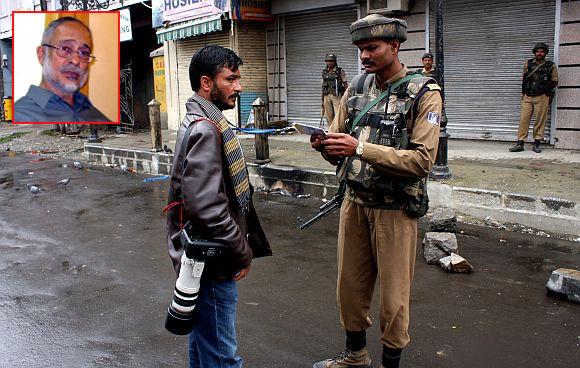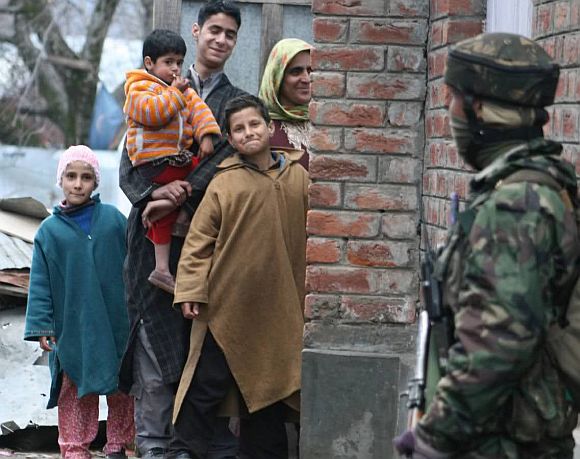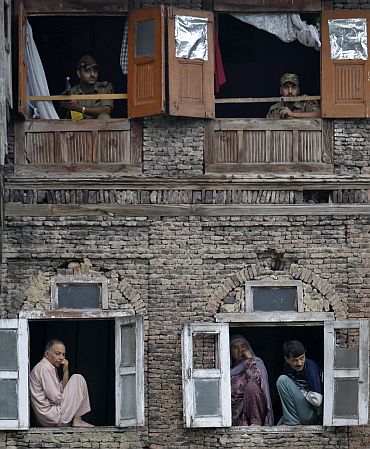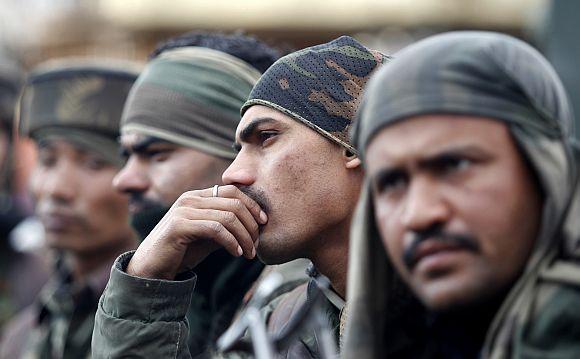
The controversy over the Armed Forces Special Powers Act has been raging for several years. The act's opponents argue that soldiers use the legal protection they enjoy under the Act as a cover to take the law into their own hands and abuse human rights with impunity.
The Army, however, insists that without the act, its troops would be hamstrung during counter-insurgency operations in Jammu & Kashmir and the North-East.
In an exclusive interview, Maj-Gen Sudhir Vombatkere (retd), who was additional director general for discipline and vigilance at the Army headquarters with the human rights cell, tells Bula Devi that the AFSPA should be used only for brief and limited periods and only to facilitate specific missions. This will also prevent politicians from exploiting the situation to gain undue advantage.
Why is the Army unwilling to let go of the AFSPA?
The AFSPA is an act that empowers the Army in a police role for internal security duties. While the police have the power to open fire, the Army does not. The Army can only open fire on an enemy of the State. In normal disturbances which take place in towns and other places in the country, the Army is called out sometimes for a flag march, and during that flag march we have a magistrate.
The magistrate is supposed to authorise the column in-charge to open fire in case it is required. The magistrate is supposed to give a written order to open fire. When a whole area is under the Disturbed Areas Act it is not possible to have magistrates with every column or platoon that goes out. Therefore, one has to authorise the soldier to open fire at his discretion. The soldier, however, very rarely opens fire. It is mostly the non-commissioned officers and junior commissioned officers who open fire.
The AFSPA has a contentious clause that says '...fire upon or otherwise use force, even to the causing of death...' Do you think we can do away with this clause?
The Army needs it. The amendment that they need to bring in the AFSPA is a clause with a deadline such as not more than 90 days in a calendar year or not more than 30 days at a stretch, so that the Army is not deployed the way it has been for six decades. It is not a joke! The people do not want it. Nobody wants the Army to be there. Neither does the Army want to be there. It is, however, the successive governments in power which want the Army to be there.
It gives them a free hand for corruption in various ways. There is political darkness once the Disturbed Areas Act is imposed. It is the political darkness that encourages corruption of various kinds -- political, economic, financial, money, women, drugs, smuggling etc; nobody dares to move in the area because there are sandbags at every corner, people are discouraged from speaking up, dissent is not tolerated whereas dissent is a very important part of the democratic functioning of the country, of an individual.
...
Click here for Realtime News on the Armed Forces (Special Powers) Act

Do you think the Army also likes to be on internal security duty now?
The Army institutionally has no vested interest in being on internal security duties, which is a secondary role of the Army. The Army has a vested interest in its primary role, which is the defence of the country against external aggression. Internal security duties due to disturbed conditions, social tensions and unrest in the country, is the primary role of the administration, which is the government, an elected executive with administrative executive along with the police. It is their primary duty to maintain peace and order and look after the welfare of the people.
Why is the Army deployed in Kashmir and the North-East for so many decades when even in Punjab the Army was moved out?
The Army has no institutional stake in being deployed there; rather the Army stands to lose. We lose in two ways -- one, we lose time in training the Army for its primary role of defence and, secondly, psychological casualties of extreme stress that includes the knowledge that you are shooting some of your own people. So down at the ground level of the Army, the jawans, the junior officers, they hate this stuff. They would be extremely happy to be sent away to the border and sit in a bunker there.
So you mean to say that the Army has no vested interest to stay put on internal duty?
Institutionally zero.
When you emphasise on the word "institutionally", are you leaving out some grey area?
Well, there may be individuals. It is possible that some senior officers who see career advancement by showing his ability in this manner. It is always possible.
This has been happening for decades?
It is not the same officer and not the same chief minister. And, here comes governance. It is impossible that the successive chief ministers have not observed the 'interest' of the formation in remaining in internal security duty. So why has he (the chief minister) not cancelled the Disturbed Areas Act from there? So there is always a shaking of hands at some level and some sta#8805 it is possible that the minister and the officer at a high level have said that 'okay, you carry on with your duty here; we need you here and you want to be here'.
...

Is it also that the political side doesn't want to take the risk, because with the Army around the politicians can sit back without fear?
No, it gives politicians the licence to do his dirty work. The civil administration at the higher level indulges in corruption while the Army is holding the fort there. Often we have seen that while action is going on and the Army is holding the militants at bay, the police makes money. For instance, the Army captures some militants, hands them over to the police because the Army cannot keep them and the police immediately releases them with their weapons for a consideration.
But does it happen only at the lower level?
I am sure it is happening at a senior level also but in what precise manner I don't know. Wherever there is centralisation of power, wherever there is secrecy, there is darkness and corruption takes place in darkness. This is political darkness.
If that is so, why didn't it happen in Punjab?
In Punjab, KPS Gill was very powerful. He worked it out. He may have used many methods that one would not approve of but the fact remains he sorted it out.
So you are saying it is one KPS Gill...?
No, it's not one KPS Gill; it is the whole situation. Punjab is not as distanced from India like the North-East or Kashmir. Punjab is very much part of Indian heartland. There is an emotional link. So, it was possible for all of India to work together and sort this out. Whereas today, if you ask anyone about the North-East they would not know which state is where, who is the chief minister. Every state has its own character, which is virtually unknown. The strong culture of the North-East or the Sufi culture of Kashmir is virtually unknown.
When an Army man is in action, does ethnicity play a factor?
I don't think so. I don't think the element of ethnicity comes into play while in action.
What kind of cases did you come across when you were posted in the Army headquaters?
I came across cases of robbery, rape, murder which were reported to the human rights commission and we went and interacted with the human rights commission. In fact, I was sent as a representative of India to the International Committee of the Red Cross at Geneva and I interacted with them on the problems of the military concerning human rights while on internal security duty. So, cases do come up to the human rights commission and we investigate them.
Any big case that you remember?
No, I don't remember offhand. But action is always taken against anyone found guilty; sometimes people are dismissed from the services.
...

Why doesn't the Army make it public when they take action against someone from the rank and file for their misdeeds?
It will be demotivating, (when action is taken) the (Army) unit knows that so and so has been dismissed from service and that itself is demotivating. We take disciplinary action not to make a splash in the newspapers but to maintain battle efficiency. You cannot have a bad hat in a team because if you have a bad hat the team will fail; he will let the team down. If I cannot trust my buddy in operations, I will be killed. If my buddy is not good I will reject him, the unit will reject him. That is why cover-up in the Army within the unit is very rare. I am not saying it does not happen but it's rare, and the reason for this is the regimental tradition and battle efficiency.
But we do come across cases where people within the Army have cooperated with each other?
Of course, they have; you heard about cases like the 'Ketchup Colonel'. There are cases. We are no angels. But, we got a disciplinary system which functions and that does not happen anywhere else in the country.
Is the Army going downhill?
No, it is not. Definitely not in its primary role.
Not at all?
Not in its primary role. You cannot do everything well. The Army should not be in the secondary role. Nearly one-third of the Army is deployed in the secondary role and it is at the cost of the efficiency in its primary role.
Our battle preparedness is good. But, by engaging the Army more and more and continuously in the secondary role, ie, internal security and counter insurgency, you might compromise on its primary role at some point.
The Chinese now are a threat, this is my personal perception. I understand a large formation of the People's Liberation of Army of China is on the northern border in the Tibet area and they have moved missile batteries. This is all because they have got a railway line to Lhasa. Many things are happening at the same time -- the massing of the Army there, pressure of America on Pakistan and China being friends with Pakistan, for whatever historical reason, China's base at Gwadar, then the-so called String of Pearls, China activating the Burmese Coco islands on north Andamans, China trying to get a economic toehold in Sri Lanka, China trying to build a dam on the Brahmaputra, etc.
One has to put all this together and make a picture and it makes a very dark picture, I don't like it. And, here one-third of the Army is being pushed into this kind of work (secondary role).
What should be done?
I think the Army should be withdrawn from the secondary role and allowed to be trained and look to its primary role.
Then what happens to internal security?
That is where the government needs to start doing governance, that's precisely the point.